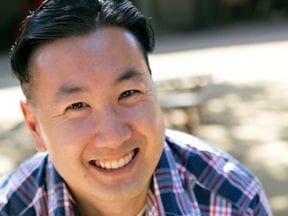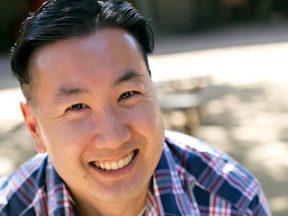Steve Chou is a merchant, blogger, podcaster, and trainer. He’s now also a book author with the release in May of “The Family First Entrepreneur,” his HarperCollins title on business, freedom, and priorities.
This is Chou’s third appearance on the podcast. In 2020 he discussed Bumblebee Linens, his osCommerce store. In 2022 he described his preference for frugal living despite having achieved financial success.
In this interview, Chou addresses the process of publishing and promoting his book, now a Wall Street Journal bestseller. The entire audio of our conversation is embedded below. The transcript is edited for length and clarity.
Eric Bandholz: Tell us about your book.
Steve Chou: It’s called “The Family First Entrepreneur.” It’s about my values and prioritizing life so that the business doesn’t run you, and you have the freedom to do whatever you want and spend time with who you want.
It’s always been a bucket-list item to write a book. That’s mostly why I did it. It’s not a money play. I dreamed of taking my kids to a Barnes & Noble and showing my book on the shelf. I did that two weeks ago.
In terms of business and strategy, hitting a bestseller list instantly adds credibility. Outside of that, it’s a pretty good lead generator for anything else you do. If you sell a course, digital product, or membership, folks can find you that way. It’s a low-cost way for them to learn more about your work.
I got a book deal, so I was given an advance. The process took a year. I put together a proposal, which was around 50 pages. It had projections on how many books I could sell. It had an outline of the book and included a sample chapter. It was a lot of work to put that thing together.
I had interviewed many bestselling authors on my podcast, so I hit them up and asked how I could get a book deal. One of my buddies, Jeff Goins, was dabbling with a book-in-a-box service, essentially a book consultant. I hired him, and he coached me through the entire process.
I wanted to go the traditionally published route — mainly for ego reasons. I pitched to eight to 10 publishers such as Simon & Schuster, HarperCollins, and Penguin. You hop on a Zoom call, meet the personnel there, and see if you get along. Then you set a date when all the publishers bid on what to pay you in advance to write the book. You look at all the offers and select one. I went with HarperCollins — they gave a six-figure advance, which was the highest.
I get a 15% cut on hard copy sales and 25% for ebooks and Audible. I won’t make more than the six-figure advance until the sales exceed that amount, which would be tens of thousands of books.
If you’re doing it for the money, self-publishing is best because you get to keep all the proceeds. When you go traditionally published, that carries with it some prestige. Plus, it’s much easier to hit a bestseller list.
The publishing business is like venture capital. Publishers invest in a bunch of writers, and they need only one James Clear [“Atomic Habits”] or one Mark Manson [“The Subtle Art of Not Giving a F*ck”] to make their business for the next 10 years. “Atomic Habits” sells around 22,000 copies every week. It’s impossible to knock that guy off The Wall Street Journal’s bestselling business books list.
Bandholz: How does someone produce the next “Atomic Habits”?
Chou: The first step is the launch. You want to sell a bunch of books quickly to hit a bestseller list. I had a three-prong attack. I reached out to folks who had sponsored me and asked them to do a bulk book buy for their audience. Ultimately, you have to get books into the hands of real people. If you want to sell thousands of books by launch, you have a huge audience or leverage others. Many of the books I sold were from contacts who bought in bulk and distributed them for free to their audience.
My book launch coach advised me to go on 200 podcasts. I asked him what the biggest bang for my buck would be without sacrificing 200 hours of my time, and he told me to do a lot of good bonuses for my own audience, get companies to do bulk buys, and then go on at least the heavy-hitting podcasts — the 10 or 20 that have gigantic audiences. That’s essentially what I did.
I interviewed as many of the big podcasters on my own podcast as possible and promoted the heck out of anything they wanted to sell. When it came time for my book to launch, I hit up all of them and said, “Hey, remember me? I was wondering if you’d be willing to have me on your show. I have a book coming out.” Almost all of them said yes. It’s a networking play.
The bulk buys and bonuses ended up moving the most books. I offered three bonuses with the purchase of the book. One was a three-day workshop on how to get started with print-on-demand, which I consider a gateway to ecommerce. Then I had a two-day seminar on how to get started and make money with blogging, YouTube-ing, and podcasting, which are three things I do. Then I offered a six-week “Family First” challenge, where I live stream in a private Facebook group to help everyone with their side hustles.
If you go the traditionally published route, you must have an audience. You won’t get a book deal unless you have a following, whether it be on YouTube or podcasting, if you have an extensive email list. When I applied, I think my YouTube channel was still pretty small. I think it was 90,000 subscribers. I had been podcasting for a long time. I had an email list of 100,000, plus my blog.
Bandholz: Listeners might recall your two businesses. Bumblebee is an online store selling handkerchiefs. My Wife Quit Her Job is a media and training site. Have you seen a sales lift with those?
Chou: Definitely for My Wife Quit Her Job. For Bumblebee, I don’t think so. We sell handkerchiefs. What are the chances that someone wants a handkerchief? Pretty low.
I plan on making the book part of my overall marketing strategy because I have a unique message compared to all the other make-money-online guys. It’s a way to differentiate myself, and having made The Wall Street Journal bestseller list adds credibility to everything I do.
I want to stay on that list for the long run. But it takes time. I have to go on a lot of podcasts and make people aware of my book, and hopefully, down the line, it becomes a household book, like “The 4-Hour Workweek” or “Rich Dad Poor Dad.”
Bandholz: Where can people buy your book?
Chou: Go to TheFamilyFirstEntrepreneur.com. To learn more about what I do, go to MyWifeQuitHerJob.com. If you are getting married, I’ll hook you up with some handkerchiefs at BumblebeeLinens.com.





